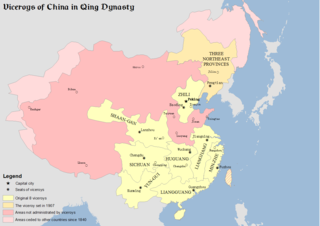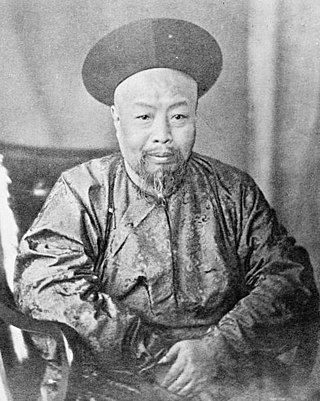| |||||
| Decades: | |||||
|---|---|---|---|---|---|
| See also: | Other events of 1859 History of China • Timeline • Years | ||||
Events from the year 1859 in China .
| |||||
| Decades: | |||||
|---|---|---|---|---|---|
| See also: | Other events of 1859 History of China • Timeline • Years | ||||
Events from the year 1859 in China .

The 1850s was a decade of the Gregorian calendar that began on January 1, 1850, and ended on December 31, 1859.

The Taiping Rebellion, also known as the Taiping Civil War or the Taiping Revolution, was a civil war in China between the Manchu-led Qing dynasty and the Hakka-led Taiping Heavenly Kingdom. It lasted from 1850 until the fall of Tianjing in 1864, although the last rebel army was not wiped out until August 1871. The conflict resulted in approximately 20 to 30 million deaths, approximately one-tenth to one-twentieth of China's population at the time. The established Qing government won decisively, although at great cost to its fiscal and political structure.

Hong Xiuquan, born Hong Huoxiu and with the courtesy name Renkun, was a Chinese revolutionary and religious leader who led the Taiping Rebellion against the Qing dynasty. He established the Taiping Heavenly Kingdom over large portions of southern China, with himself as its "Heavenly King".

The Xianfeng Emperor, also known by his temple name Emperor Wenzong of Qing, personal name Yizhu, was the eighth emperor of the Qing dynasty, and the seventh Qing emperor to rule over China proper, reigned from 1850 to 1861. During his reign, the Qing dynasty experienced several wars and rebellions including the Taiping Rebellion, Nian Rebellion, and Second Opium War. He was the last Chinese emperor to exercise sole power.

Zongdu were the managers supervising provincial governors in Ming and Qing China. One viceroy usually administered several provinces and was in charge of all affairs of military, food, wages, rivers, and provincial governors within their region of jurisdiction. Viceroys was appointed by and directly reported to the Emperor.
Hong Rengan was an important leader of the Taiping Rebellion. He was a distant cousin of the movement's founder and spiritual leader Hong Xiuquan. His position as the Gan Wang resembled the role of a prime minister. He is a noted figure in history because of the sweeping reforms attempted under his rule, and because of his popularity in the West.

The Jintian Uprising was an armed revolt formally declared by Hong Xiuquan, founder and leader of the Emperor Worshippers, on 11 January 1851 during the late Qing dynasty of China. The uprising was named after the rebel base in Jintian, a town in Guangxi within present-day Guiping. It marked the beginning of the Taiping Rebellion.
Feng Yunshan was the South King of the Taiping Heavenly Kingdom, a distant cousin and early accomplice of Hong Xiuquan, and an important leader during the Taiping Rebellion against the Qing government. He was one of the first Taipings to be baptized and established the first group of God Worshippers during the 1840s. He was killed during the initial stages of the rebellion, prior to the establishment of the Taiping's capital of Tianjing at Nanjing.
Theodore Hamberg was a Swedish missionary and author active in China. He is known for his role in having authored an important account on the early Taiping rebellion and for his role in establishing Christian missions in Guangdong province. He also laid the foundations for the study of the Hakka dialect in the West.
Events from the year 1804 in Ireland.

Ye Mingchen was a high-ranking Chinese official during the Qing dynasty, known for his resistance to British influence in Canton (Guangzhou) in the aftermath of the First Opium War and his role in the beginning of the Second Opium War.

HMS Pearl was a Pearl-class 21-gun screw corvette of the Royal Navy launched in 1855, displacing 2,187 tons.
Events from the year 1859 in Ireland.

Bao'an County, formerly named Xin'an County, was a historical county in South China. It roughly follows the administrative boundaries of modern-day Hong Kong and the city of Shenzhen. For most of its history, the administrative center of the county was in Nantou.

The Taiping Heavenly Kingdom (1851–1864) was a theocratic absolute monarchy which sought to overthrow the Qing dynasty. The Heavenly Kingdom, or Heavenly Dynasty, was led by Hong Xiuquan. Its capital was at Tianjing, present-day Nanjing. The unsuccessful war it waged against the Qing is known as the Taiping Rebellion.
Numerous rebellions against China's Qing dynasty took place between the mid-19th and early 20th centuries, prior to the abdication of the last Emperor of China, Puyi, in February 1912. The table below lists some of these uprisings and important related events.
Events in the year 1859 in India.
Royal Asiatic Society Hong Kong Branch is an organisation to encourage interest in Asia broadly, with an emphasis on Hong Kong. The society was founded in 1847 and folded 1859. It was revived on December 28, 1959. Its parent association is the Royal Asiatic Society of Great Britain and Ireland.
Events from the year 1864 in China.
The Eastern Expedition encompassed the Taiping Heavenly Kingdom's efforts to capture the Yangtze River Delta, the provinces of Jiangsu, Anhui, and Zhejiang. Most of the areas would eventually be occupied by the Taipings, but they were notably repulsed at several locations, especially the city of Shanghai. Following the Jintian uprising in the southern province Guangxi and the beginning of open hostilities, Taiping forces attacked and captured Nanjing in central China by 1853. The Western Expedition captures cities along the Yangtze River like Zhenjiang, Anqing were captured later the same year.